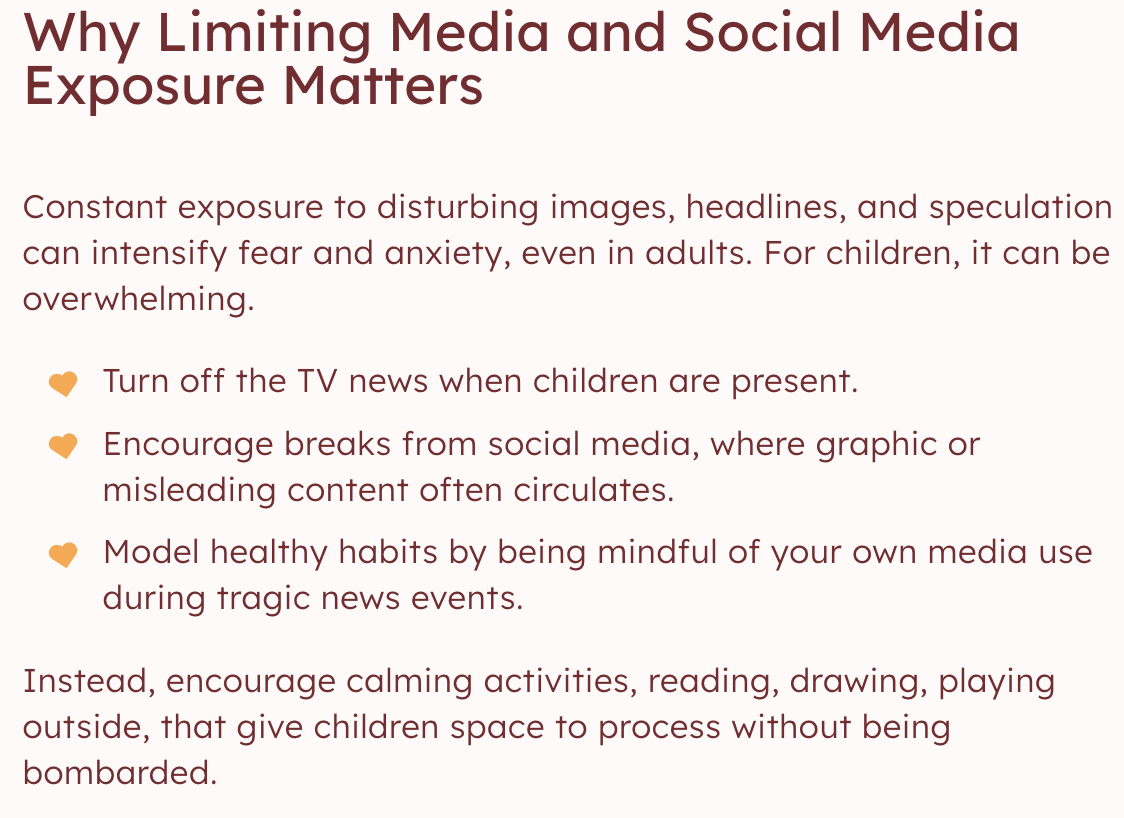Helping Children Cope with Tragic News: School Shootings
When tragic events like school shootings dominate the news, children are often exposed to frightening information they may not fully understand. As caregivers, educators, and community members, it’s natural to feel uncertain about how to support children during such distressing times. While we cannot shield them entirely, we can guide them through their feelings with compassion, honesty, and age-appropriate conversations.
Age-Appropriate Ways to Talk About School Shootings
Children of different ages process traumatic events differently. Tailoring your approach to their developmental level helps them feel supported and secure:
Young children (ages 4–7): Keep explanations simple and brief. Avoid graphic details and focus on reassurance. You might say, “Something very sad happened at another school, but your teachers and we are here to keep you safe.”
Elementary school children (ages 7–12): Answer questions honestly, but with care. Encourage them to share what they’ve heard and correct misinformation. They may want to know about safety procedures at their own school.
Teenagers: Teens may already know a lot through peers and media. Allow open discussions and listen without judgment. They may want to talk about deeper issues, like gun violence, mental health, or community safety.
No matter the age, it’s important to create a space where children feel safe to ask questions and express emotions.
Providing Reassurance Without Making False Promises
Children often seek comfort in knowing they are safe. While it’s tempting to say, “This will never happen here,” such promises can undermine trust if children later learn otherwise. Instead:
Emphasize the safety measures schools take (locked doors, emergency drills, supportive staff).
Remind children that while events like school shootings are serious, they are rare.
Reinforce the many adults, teachers, principals, parents, police officers, who work together to protect them.
This balanced approach offers comfort without denying the reality of risk.
Signs of Stress to Watch For
Children don’t always verbalize their worries directly. Stress and fear can show up in subtle ways, such as:
Sleep disturbances or nightmares
Physical complaints like stomachaches or headaches
Withdrawal from friends or activities
Irritability, clinginess, or regression in younger children (e.g., bedwetting)
Difficulty concentrating at school
These are normal reactions in the short term. However, if symptoms persist for more than a couple of weeks, or if they intensify, professional support may be needed.
When to Seek Professional Support
Sometimes children need additional help to process tragic news. Consider reaching out to a school counselor, pediatrician, or child therapist if you notice:
Extreme or ongoing anxiety
Persistent sadness or hopelessness
Self-harming behaviors or talk of wanting to die
Refusal to attend school out of fear
Seeking support is a sign of strength, not failure. Early intervention can make a significant difference in helping children recover and build resilience.
School shootings are heartbreaking and difficult to discuss, but silence can leave children more confused and fearful. By approaching conversations with honesty, reassurance, and sensitivity, we can help children feel safer and more supported in uncertain times. If your child is struggling to cope, reaching out to a trusted resource. At Tampa Pediatric Psychology, we specialize in helping children process their emotions, build resilience, and find healthy ways to cope during challenging times.


